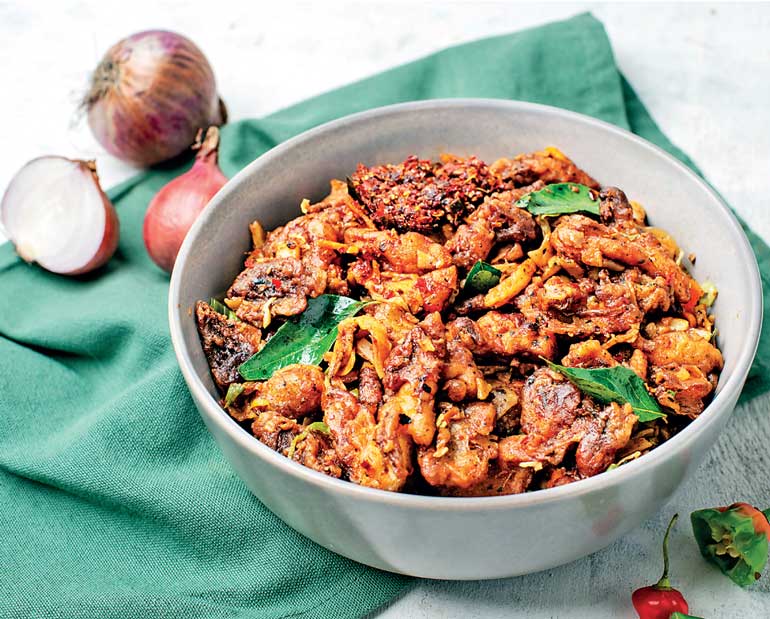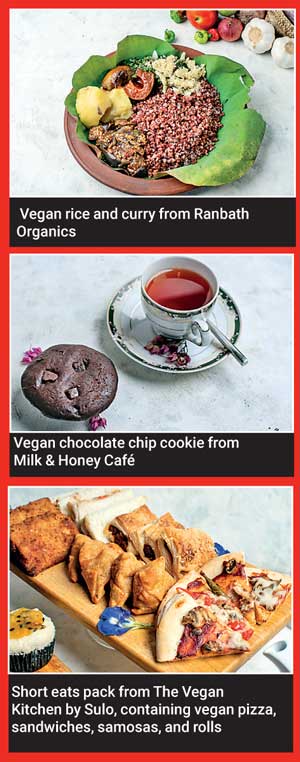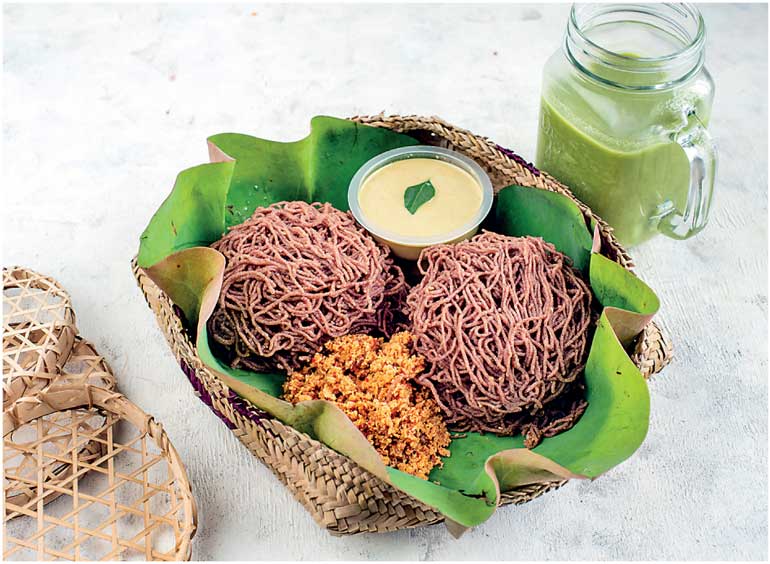Sunday Feb 15, 2026
Sunday Feb 15, 2026
Saturday, 16 October 2021 00:05 - - {{hitsCtrl.values.hits}}

Mushroom kottu from The Vegan
 Moving towards plant-based food is good for your health, good for the environment, good for animals, and good for the planet. With the increasing awareness of these benefits, people are becoming more conscious of their dining choices and aspects of cruelty-free, sustainable, climate-friendly, and plant-based food.
Moving towards plant-based food is good for your health, good for the environment, good for animals, and good for the planet. With the increasing awareness of these benefits, people are becoming more conscious of their dining choices and aspects of cruelty-free, sustainable, climate-friendly, and plant-based food.
As a basic definition, vegetarian diets can include anything but meat, and may also include abstaining from by-products of animal slaughter. A vegan diet goes one step further and consists exclusively of plant-based foods, including whole grains, vegetables, fruits, seeds, and pasta. Vegetarians in many cases still consume milk and eggs, while vegans do not consume any kind of animal product. Changing toward a plant-based diet can be beneficial, but it is important to use proper guidance, ensure that all nutritional needs are met, and make sure the diet remains healthy and easy to follow in the long run.
Sri Lanka is home to a wide variety of fruits and vegetables with high nutritional value as well as many plant-based curries. However, restaurants and eateries do not necessarily have dedicated menus or meal options labelled as vegan or vegetarian, although this has begun to change in recent years, particularly in Colombo and other urban centres. Besides the many traditional dishes that are already plant-based or can be adjusted without much difficulty, there is also an increasing number of restaurants offering dedicated vegetarian or vegan meal options.
A multitude of plant-based choices
For those interested in uniquely Sri Lankan cuisine, several restaurants around Colombo provide completely plant-based versions of Sri Lankan staples, traditional choices, or fusion recipes. Places like Hela Bojun Food Centres or Ranbath Organics, for instance, provide healthy, organic rice and curry with heirloom rice varieties that are free of meat and animal products, yet still have rich taste and variety.
Another example is Lamprais by Shey, a home-based business that delivers a vegan version of lamprais, with a pack that contains fragrant rice, aubergine curry, ash plantain curry, seeni sambol, TVP (soya) curry, and two cutlets. Each of these curries compliments the others and makes for a filling meal without any meat inside.
Similarly, The Vegan, a cafe serving purely vegan food and an array of Western and Asian fusion cuisine, offers a mushroom kottu that tastes different and yet delicious. Another meatless kottu variant is served by the Vegan Kitchen by Sulo, one of the forerunners of Colombo’s vegan restaurant industry. Their “sheeze kotthu” is filled with vegetables and home-made vegan cheese, which is creamy and flavourful without animal ingredients. Sulo’s Vegan Kitchen has already “veganised” many other popular non-vegan foods and food ingredients, ranging from cakes, burgers, and submarines to mock meat and even vegan eggs.
Other places in Colombo have begun to offer vegan high tea or vegan buffets, such as the one in Mount Lavinia Hotel (currently closed due to the hotel’s renovation) or the pre-pandemic vegan high tea at Tea Avenue, with a spread that included spinach quiches, bruschetta, crispy potato rolls, spinach/spring onion wraps, a vegan mini-burger, brownies, tiramisu, and a fruit cocktail.
An example of Italian cuisine is Dolce Italia, which has a separate vegan menu included within their normal menu. The options without any animal products are wide-ranging and include breakfast, salads, soups, pizza, pasta, polenta, and even desserts. From croissants to soya milk cappuccinos and from seitan Bolognese spaghetti to vegan cookies, the vegan menu leaves little to be desired. Natural Eats provides meal plan subscriptions and healthy dishes. It started out as a food stall at Good Market, but now has its own permanent location and a menu that includes healthy sandwiches and breakfast bowls, and then offer lunch and dinner service as well. A large portion of the Natural Eats menu consists of vegan and vegetarian items along with dairy-free drinks. One highlight is the signature vegetarian sandwich, which offers a combination of tofu, hummus, onion chutney, and an in-house pomegranate jam in which everything is made from scratch.
There are many other interesting and imaginative options out there, such as the Peking Tofu Roll with Sweet Potatoes at Nuga Café or the vegan noodles from Smokey’s Café. The latter dish consists of a bowl of rice noodles surrounded by roasted manioc chunks, egg-plant pieces, ash plantain peels, ash plantain chips, mashed and roasted pumpkin, string beans, and wing beans, with a home-made peanut sauce to round it off.
Vegan sweets and desserts
Due to the tropical climate and rich variety of fruits, it is incredibly easy to keep desserts completely plant-based in Sri Lanka. There are many fresh fruits available throughout the year with unique flavours, aromas, and colours, such as bananas, papayas, mangoes, melons, pineapples, mangosteen, ripe jacks, avocadoes, rambutan, star fruits, passion fruits, or anoda. In addition, most of Sri Lanka’s traditional confectionery is vegan as well.
However, there are additional options beyond this. For example, Isle of Gelato offers dairy-free and vegan sorbets while places like Milk & Honey Café, Fit Sugar, or Dolce Italia sell vegan cakes, cupcakes, cookies, eclairs, and other bakery goods. If milk is not an issue, there are many vegetarian, gelatine- and egg-less sweets available as well in Colombo, such as the North Indian sweets at Bombay Sweet House and Bombay Sweet Centre, including jelebi or different kinds of berfi and laddu.
 A vibrant food space
A vibrant food space
The restaurants, cafés, and delivery services mentioned above are not an exhaustive list but provide examples of the vibrant vegetarian and vegan food space that can be seen in Colombo today, in some cases based on pre-pandemic visits or home delivery options. It is heartening that more and more outlets label plant-based food options in their menus or separately offer their vegan repertoires. Having more choices is a benefit for those already following plant-based diets but also makes it easier for people to try new options, get inspiration, and mix up their own diets.
Good practices for restaurants include being transparent about the ingredients they use for their products as well as providing the number of calories, percentage of good fat, carbohydrates, and protein content of all items in their menu. If they are trying out meat substitutes and other vegan options, feedback forms could help to judge the experience of guests and help refine the taste, texture, and appearance of menu items.
There is an opportunity to connect plant-based eating with ethical entrepreneurship. Accelerator programmes could strengthen the start-up ecosystem, support good business practices, and encourage sustainable, climate-friendly, resilient, and ethical consumption and production. This can entail awareness creation, capacity-building, and support for dedicated vegan or vegetarian food outlets and brands as well as plant-based options to diversify existing menus and offer a broader range of options.
If done right, vegan and vegetarian food can be nutritious, full of flavour and textures, and appealing to all customers, even if they are not vegan or vegetarian themselves. Innovating and experimenting while building on traditional recipes and local produce can create amazing meals and simultaneously boost entrepreneurship, the economy, animal welfare, public health, and climate action.
Pix courtesy SLYCAN Trust

Kurakkan flour string hoppers with coconut sambol and kiri hodi from Ranbath Organics
(The writer works as Director – Research & Knowledge Management at SLYCAN Trust, a non-profit think tank based in Sri Lanka. His work focuses on climate change, adaptation, resilience, ecosystem conservation, just transition, human mobility, and a range of related issues. He holds a Master’s degree in Education from the University of Cologne, Germany and is a regular writer to several international and local media outlets.)